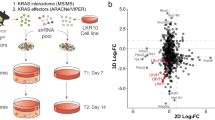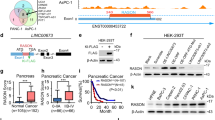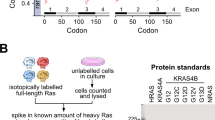Abstract
Kras is the most frequently mutated ras family member in lung carcinomas1,2, whereas Hras mutations are common in tumors from stratified epithelia such as the skin. Using a Hras knock-in mouse model3, we demonstrate that specificity for Kras mutations in lung and Hras mutations in skin tumors is determined by local regulatory elements in the target ras genes. Although the Kras 4A isoform is dispensable for mouse development4,5, it is the most important isoform for lung carcinogenesis in vivo and for the inhibitory effect of wild-type (WT) Kras on the mutant allele6,7. Kras 4A expression is detected in a subpopulation of normal lung epithelial cells, but at very low levels in lung tumors, suggesting that it may not be required for tumor progression. The two Kras isoforms undergo different post-translational modifications8; therefore, these findings can have implications for the design of therapeutic strategies for inhibiting oncogenic Kras activity in human cancers.
This is a preview of subscription content, access via your institution
Access options
Subscribe to this journal
Receive 12 print issues and online access
$209.00 per year
only $17.42 per issue
Buy this article
- Purchase on Springer Link
- Instant access to full article PDF
Prices may be subject to local taxes which are calculated during checkout





Similar content being viewed by others
References
Bos, J.L. ras oncogenes in human cancer: a review. Cancer Res. 49, 4682–4689 (1989).
You, M., Candrian, U., Maronpot, R.R., Stoner, G.D. & Anderson, M.W. Activation of the Ki-ras protooncogene in spontaneously occurring and chemically induced lung tumors of the strain A mouse. Proc. Natl. Acad. Sci. USA 86, 3070–3074 (1989).
Potenza, N. et al. Replacement of K-Ras with H-Ras supports normal embryonic development despite inducing cardiovascular pathology in adult mice. EMBO Rep. 6, 432–437 (2005).
Johnson, L. et al. K-ras is an essential gene in the mouse with partial functional overlap with N-ras. Genes Dev. 11, 2468–2481 (1997).
Plowman, S.J. et al. While K-ras is essential for mouse development, expression of the K-ras 4A splice variant is dispensable. Mol. Cell. Biol. 23, 9245–9250 (2003).
Zhang, Z. et al. Wildtype Kras2 can inhibit lung carcinogenesis in mice. Nat. Genet. 29, 25–33 (2001).
To, M.D. et al. A functional switch from lung cancer resistance to susceptibility at the Pas1 locus in Kras2LA2 mice. Nat. Genet. 38, 926–930 (2006).
Konstantinopoulos, P.A., Karamouzis, M.V. & Papavassiliou, A.G. Post-translational modifications and regulation of the RAS superfamily of GTPases as anticancer targets. Nat. Rev. Drug Discov. 6, 541–555 (2007).
Pells, S. et al. Developmentally-regulated expression of murine K-ras isoforms. Oncogene 15, 1781–1786 (1997).
Wang, Y., You, M. & Wang, Y. Alternative splicing of the K-ras gene in mouse tissues and cell lines. Exp. Lung Res. 27, 255–267 (2001).
Ventura, J.J. et al. p38alpha MAP kinase is essential in lung stem and progenitor cell proliferation and differentiation. Nat. Genet. 39, 750–758 (2007).
Jackson, E.L. et al. Analysis of lung tumor initiation and progression using conditional expression of oncogenic K-ras. Genes Dev. 15, 3243–3248 (2001).
Johnson, L. et al. Somatic activation of the K-ras oncogene causes early onset lung cancer in mice. Nature 410, 1111–1116 (2001).
Balmain, A. & Pragnell, I.B. Mouse skin carcinomas induced in vivo by chemical carcinogens have a transforming Harvey-ras oncogene. Nature 303, 72–74 (1983).
Nelson, M.A., Futscher, B.W., Kinsella, T., Wymer, J. & Bowden, G.T. Detection of mutant Ha-ras genes in chemically initiated mouse skin epidermis before the development of benign tumors. Proc. Natl. Acad. Sci. USA 89, 6398–6402 (1992).
Ise, K. et al. Targeted deletion of the H-ras gene decreases tumor formation in mouse skin carcinogenesis. Oncogene 19, 2951–2956 (2000).
Wang, M., Wang, Y. & You, M. Identification of genetic polymorphisms through comparative DNA sequence analysis on the K-ras gene: implications for lung tumor susceptibility. Exp. Lung Res. 31, 165–177 (2005).
Dankort, D. et al. A new mouse model to explore the initiation, progression, and therapy of BRAFV600E-induced lung tumors. Genes Dev. 21, 379–384 (2007).
Patek, C.E. et al. Mutationally activated K-ras 4A and 4B both mediate lung carcinogenesis. Exp. Cell Res. 314, 1105–1114 (2008).
Hancock, J.F. Ras proteins: different signals from different locations. Nat. Rev. Mol. Cell Biol. 4, 373–384 (2003).
Li, W., Zhu, T. & Guan, K.L. Transformation potential of Ras isoforms correlates with activation of phosphatidylinositol 3-kinase but not ERK. J. Biol. Chem. 279, 37398–37406 (2004).
Voice, J.K., Klemke, R.L., Le, A. & Jackson, J.H. Four human ras homologs differ in their abilities to activate Raf-1, induce transformation, and stimulate cell motility. J. Biol. Chem. 274, 17164–17170 (1999).
Quintanilla, M., Brown, K., Ramsden, M. & Balmain, A. Carcinogen-specific mutation and amplification of Ha-ras during mouse skin carcinogenesis. Nature 322, 78–80 (1986).
Li, J. et al. LOH of chromosome 12p correlates with Kras2 mutation in non-small cell lung cancer. Oncogene 22, 1243–1246 (2003).
Guerrero, I., Villasante, A., Corces, V. & Pellicer, A. Loss of the normal N-ras allele in a mouse thymic lymphoma induced by a chemical carcinogen. Proc. Natl. Acad. Sci. USA 82, 7810–7814 (1985).
Diaz, R. et al. Inhibition of Ras oncogenic activity by Ras protooncogenes. Int. J. Cancer 113, 241–248 (2005).
Plowman, S.J. et al. K-ras 4A and 4B are co-expressed widely in human tissues, and their ratio is altered in sporadic colorectal cancer. J. Exp. Clin. Cancer Res. 25, 259–267 (2006).
Kim, C.F. et al. Identification of bronchioalveolar stem cells in normal lung and lung cancer. Cell 121, 823–835 (2005).
Nagase, H., Mao, J.H. & Balmain, A. Allele-specific Hras mutations and genetic alterations at tumor susceptibility loci in skin carcinomas from interspecific hybrid mice. Cancer Res. 63, 4849–4853 (2003).
Mao, J.H. et al. Mutually exclusive mutations of the Pten and ras pathways in skin tumor progression. Genes Dev. 18, 1800–1805 (2004).
Acknowledgements
This work was supported by CA111834 and CA084244 (A.B.). M.D.T. was supported in part by a Sandler Foundation Postdoctoral Research Fellowship. C.E.W. was supported by the Swiss National Science Foundation (SNSF). R.D.L. was supported by a grant of Associazione Italiana per la ricerca sul cancro (AIRC). A.B. acknowledges support from the Bruce and Davina Isackson Foundation and from the Barbara Bass Bakar Chair of Cancer Genetics. Phospho-Akt was provided by D. Stokoe (University of California San Francisco), and primary antibodies against CCA/CC10 were a gift from A. Mukherjee (National Institute of Child Health and Human Development, US National Institutes of Health).
Author information
Authors and Affiliations
Contributions
M.D.T. and A.B. designed the study. All experiments involving mice were performed by M.D.T. and R.D.R. M.D.T. performed protein analysis and mutational analysis. C.E.W. performed immunohistochemistry, and A.N.K. performed histological evaluations of lung lesions. R.D.L. provided Hras and Kras knock-in mice and was involved in interpretation of results. M.D.T. and A.B. wrote the paper, and all authors contributed to the manuscript preparation.
Corresponding author
Supplementary information
Supplementary Text and Figures
Supplementary Figure 1, Supplementary Tables 1 and 2 (PDF 645 kb)
Rights and permissions
About this article
Cite this article
To, M., Wong, C., Karnezis, A. et al. Kras regulatory elements and exon 4A determine mutation specificity in lung cancer. Nat Genet 40, 1240–1244 (2008). https://doi.org/10.1038/ng.211
Received:
Accepted:
Published:
Issue Date:
DOI: https://doi.org/10.1038/ng.211
This article is cited by
-
Targeting KRAS4A splicing through the RBM39/DCAF15 pathway inhibits cancer stem cells
Nature Communications (2021)
-
Loss of the wild-type KRAS allele promotes pancreatic cancer progression through functional activation of YAP1
Oncogene (2021)
-
Ras isoform-specific expression, chromatin accessibility, and signaling
Biophysical Reviews (2021)
-
Capturing the primordial Kras mutation initiating urethane carcinogenesis
Nature Communications (2020)
-
A model for RAS mutation patterns in cancers: finding the sweet spot
Nature Reviews Cancer (2018)



